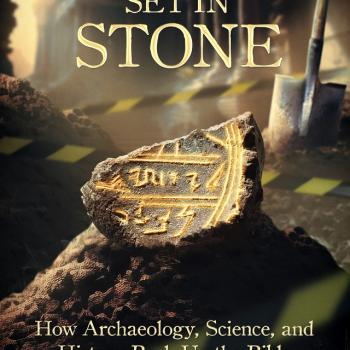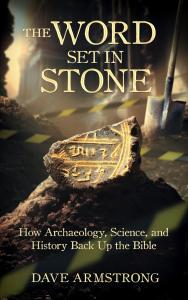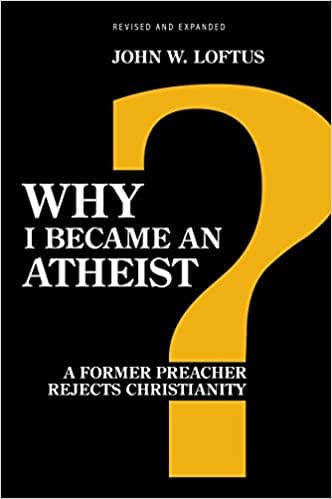ARCHAEOLOGY AND THE BIBLE / BIBLICAL ARCHAEOLOGY
Books by Dave Armstrong: The Word Set in Stone: How Archaeology, Science, and History Back Up the Bible [1-24-23]
“Dig Deep and Defend the Bible” [promotional article for for my book: The Word Set in Stone: How Archaeology, Science, and History Back up the Bible] [ Catholic Answers Magazine, 10 July 2023]
Free “Book”: The Word Set in Stone: “Volume Two”: More Evidence of Archaeology, Science, and History Backing Up the Bible (163 sections) [as of 9-30-24]
15 Archaeological Proofs of Old Testament Accuracy (short summary points from my book, The Word Set in Stone) [National Catholic Register, 3-23-23]
15 Archaeological Proofs of New Testament Accuracy (short summary points from my book, The Word Set in Stone) [National Catholic Register, 3-30-23]
Abraham
Abraham, Warring Kings of Genesis 14, & History [7-31-21]
Ehrman Errors #1: Philistines, Beersheba, Bible Accuracy [3-18-22]
Sodom Obliterated (Chapter Four from my book, The Word Set in Stone: How Archaeology, Science, and History Back up the Bible) [1-26-23]
Walking the Journey of Abraham (Chapter Three from my book, The Word Set in Stone: How Archaeology, Science, and History Back up the Bible) [3-2-23]
Amorites
Arameans, Amorites, and Archaeological Accuracy [6-8-21]
Bethlehem
Archaeology & First-Temple Period Bethlehem [4-6-23]
Camels, Domestication of
Camels Help Bible Readers Get Over the Hump of Bible Skepticism [National Catholic Register, 7-21-21]
Pearce’s Potshots #67: Camels Make an Ass of a Man [3-1-22]
Chariots, Iron (Judges and Joshua)
Pearce’s Potshots #41: 13th c. BC Canaanite Iron Chariots [7-16-21]
David, Saul, and Solomon / Kingdoms of Judah and Israel
Rarity of Non-Biblical Mentions of King David Explained [9-16-21]
King Hezekiah: Exciting New Archaeological Findings [12-13-22]
Archaeology & Solomon’s Temple-Period Ivory [1-28-23]
Archaeology & King Rehoboam’s Wall in Lachish [1-31-23]
King David: from “Myth” to History (excerpt from my 2023 book, The Word Set in Stone: How Archaeology, Science, and History Back Up the Bible) [3-14-23]
“King David Versus King Arthur” is only available as Chapter Eleven of my book, The Word Set in Stone: How Archaeology, Science, and History Back Up the Bible (Catholic Answers Press: March 15, 2023)
King Solomon’s “Mines” & Archaeological Evidence [3-24-23]
Ziklag (David’s Refuge from Saul) & Archaeology [3-29-23]
King Ahab, Queen Jezebel, & Archaeology [4-7-23]
Fall of Jerusalem (586 B.C.), Archaeology, & Biblical Accuracy [4-10-23]
Assyrian King Sennacherib, the Bible, & Archaeology [4-17-23]
Archaeology & Ten (More) Kings of Judah & Israel [4-20-23]
Solomon’s “Impossible” (?) Wealth & Archaeology [4-25-23]
Solomon’s Temple and its Archaeological Analogies (Also, Parallels to Solomon’s Palace) [4-25-23]
The Queen of Sheba, Solomon, & Archaeology [4-27-23]
Archaeology, Solomon and the Queen of Sheba [National Catholic Register, 6-2-23]
Archaeology and King Solomon’s Mines [National Catholic Register, 6-29-23]
Was King David Mythical or Historical? [National Catholic Register, 7-24-23]
Edomites
Edomites: Archaeology Confirms the Bible (As Always) [6-10-21]
Exodus / Hebrew Bondage in Egypt
Seidensticker Folly #5: Has Archaeology Disproven the Exodus? [8-15-18]
A Pharaoh’s Death (Ex 2:23) & Exodus Chronology [7-27-22]
Egyptian Proof of Hebrew Slaves During Jacob’s Time [2-17-23]
When Was the Exodus: 15th or 13th Century B.C.? [4-15-23]
Evidence for Hebrews / Semites in Egypt: 2000-1200 B.C. [5-3-23]
Biblical Hebrew Names with an Egyptian Etymology [5-9-23]
Ezra
Garden of Eden
“Search for the Garden of Eden”: available only in Chapter One in my book, The Word Set in Stone: How Archaeology, Science, and History Back Up the Bible (Catholic Answers Press: March 15, 2023)
General
God: Historical Arguments (Copious Resources) [11-9-15]
Timeline of the Patriarchs: A Summary [Facebook, 9-28-22]
Genesis: Table of Nations
Genesis 10 “Table of Nations”: Authentic History [8-25-21]
Table of Nations (Gen 10), Interpretation, & History [11-27-21]
Gerasenes / Gadarenes
Gadarenes, Gerasenes, Swine, & Atheist Skeptics [7-25-17]
Gerasenes, Gadarenes, Pigs and “Contradictions” [National Catholic Register, 1-29-21]
Goliath
Goliath’s Height: Six Feet 9 Inches, 7 Feet 8, or 9 Feet 9? [7-4-21]
Gospels: Accuracy of
Are the Gospels & Acts “Propaganda”? (Unpacking a Statement from Historian A. N. Sherwin-White) [2-16-22]
Hebrew Language
Archaeology & a Proto-Hebrew Language in 1800 BC [1-31-23]
Hittites
The Hittites: Atheist “DagoodS” Lies About Christian Apologists Supposedly Lying About How Biblical Critics Once Doubted Their Historical Existence [1-10-11, at Internet Archive]
Habitually “Lying” Christian Apologists?: 19th Century “Hittites Didn’t Exist” Radical Skepticism and Examination of Atheist DagoodS’ Replies and Charges [1-15-11, at Internet Archive]
Hittite Skeptics Chronicles, Part III: Specific Citations of Denial (Budge, Sumner, & Conder) and Biblical Historical Accuracy (in the Time of Elisha) [1-19-11, at Internet Archive]
Great Hittite Wars, Part IV: Lying Christian Egyptologist M. G. Kyle?: Atheist DagoodS Disputes Sir A. E. Wallis Budge’s Reported Hittite Skepticism [1-21-11, at Internet Archive]
“Higher” Hapless Haranguing of Hypothetical Hittites (19th C.) [10-21-11; abridged 7-7-20]
“Israelites” as a Title
Pearce’s Potshots #27: Anachronistic “Israelites”? [5-25-21]
Jesus
The Census, Jesus’ Birth in Bethlehem, & History [2-3-11]
Archaeology: Jesus’ Crucifixion, Tomb, & the Via Dolorosa [9-18-14]
Reply to Atheist Jonathan MS Pearce: Herod’s Death & Alleged “Contradictions” (with Jimmy Akin) [7-25-17]
Reply to Atheist Jonathan MS Pearce: “Contradictory” Genealogies of Christ? [7-27-17]
December 25th Birth of Jesus?: Interesting Considerations [12-11-17]
Seidensticker Folly #4: Jesus Never Existed, Huh? [8-14-18]
Was Christ Actually Born Dec. 25? [National Catholic Register, 12-18-18]
The Bethlehem Nativity, Babe Ruth, and History [National Catholic Register, 1-1-19]
Are the Two Genealogies of Christ Contradictory? [National Catholic Register, 1-5-19]
Jesus’ Resurrection: Scholarly Defenses of its Historicity [4-12-20]
Herod’s Slaughter of the Innocents: Myth & Fiction? [2-10-21]
Pearce’s Potshots #64: Archaeology & 1st Century Nazareth [2-25-22]
Quirinius & Luke’s Census: Resources on the “Difficulty” [2-26-22]
Cana: Archaeological Comparison of “Rival” Sites [3-29-23]
What We Know About Nazareth at the Time of Jesus [National Catholic Register, 11-24-23]
“Upper Room” (Last Supper & Pentecost) & Archaeology [9-30-24]
Job
Book of Job, Archaeology, History, & Geography [4-1-23]
John: Historical Accuracy of
Archaeology & the Gospel of John’s Accuracy (Ch. 15 of my book, The Word Set in Stone: How Archaeology, Science, and History Back Up the Bible) [3-2-23]
Joseph (Patriarch)
“Joseph in Egypt”: available only in Chapter Five of my book, The Word Set in Stone: How Archaeology, Science, and History Back Up the Bible (Catholic Answers Press: March 15, 2023)
Joshua’s Conquest of Canaan / Era of the Judges
Pearce’s Potshots #32: No Evidence for Joshua’s Conquest? [5-28-21]
What Archaeology Tells Us About Joshua’s Conquest [National Catholic Register, 7-8-21]
Ehrman Errors #6: Joshua’s Conquest & Science [3-23-22]
Archaeology & Judges-Era Lead & Tin Trade [1-26-23]
“Joshua and the Conquest of Canaan” is now only available as Chapter Ten in my book, The Word Set in Stone: How Archaeology, Science, and History Back Up the Bible (Catholic Answers Press: March 15, 2023)
Samson’s Death-Scene: Archaeological Confirmation [3-27-23]
Did Samson Really Destroy the Philistine Temple With His Bare Hands? [National Catholic Register, 4-28-23]
Joshua’s Conquest: Rapid, Always Violent, & Total? [5-1-23]
Judas & the Thirty Silver Coins
Judas’ “Thirty Coins of Silver”: Archaeology & History [6-18-23]
Luke: Historical Accuracy of
“St. Luke Knows His Stuff” is only available as Chapter Fourteen of my book, The Word Set in Stone: How Archaeology, Science, and History Back Up the Bible (Catholic Answers Press: March 15, 2023).
Moabites & Ammonites
Moses and the Pentateuch
Using the Bible to Debunk the Bible Debunkers (Is the Mention of ‘Pitch’ in Exodus an Anachronism?) [National Catholic Register, 6-30-21]
In Search of the Real Mt. Sinai (Fascinating Topographical and Biblical Factors Closely Examined) [8-16-21]
Fascinating Biblical Considerations About Mount Sinai [National Catholic Register, 11-23-22]
Noah’s Flood
Biblical Size of Noah’s Ark: Literal or Symbolic? [3-16-22]
Peter
Archaeology & St. Peter’s House in Capernaum [9-23-14]
Philistines
Pearce’s Potshots #33: No Philistines in Moses’ Time? [6-3-21]
Ehrman Errors #1: Philistines, Beersheba, Bible Accuracy [3-18-22]
Prophets
Prophet Elisha and Archaeology [4-4-22]
Prophet Elijah and Archaeology [4-13-22]
Is There Any Archaeological Support for the Prophet Daniel? [National Catholic Register, 4-25-22]
See “Digging Up Proofs of the Prophets”: Chapter Twelve of my book, The Word Set in Stone: How Archaeology, Science, and History Back Up the Bible (Catholic Answers Press: March 15, 2023).
Sodom and Gomorrah
Sodom & Gomorrah & Archaeology: North of the Dead Sea? [10-9-14]
Sodom Obliterated (Chapter Four from my book, The Word Set in Stone: How Archaeology, Science, and History Back up the Bible) [1-26-23]
Tower of Babel
Pearce’s Potshots #54: Tower of Babel; Who’s the “Idiot”? [11-24-21]
The Tower of Babel, Archaeology, & Linguistics [4-13-23]
Linguistic Confusion and the Tower of Babel [National Catholic Register, 6-21-22]
Tower of Babel: Dialogue with a Linguist [6-26-23]
* * *
Helpful General Articles from Others
53 People in the Bible Confirmed Archaeologically (Bible History Daily / Biblical Archeology Society, 10-13-20)
SCIENTIFIC ACCURACY AND THE BIBLE / SCIENTIFIC HARMONY WITH THE BIBLE
Adam and Eve (and Genetics)
Historicity of Adam and Eve [9-23-11; rev. 1-6-22]
Defending the Literal, Historical Adam of the Genesis Account (vs. Catholic Eric S. Giunta) [9-25-11]
Adam & Eve of Genesis: Historical & the Primal Human Pair [11-28-13]
Adam & Eve & Original Sin: Disproven by Science? [9-7-15]
Dialogue with Philosopher Dr. Lydia McGrew on Adam and Eve and the Polygenism vs. Monogenism Genetics Issue [Facebook, 5-11-17]
Only Ignoramuses Believe in Adam & Eve? [9-9-15]
Animals: Mythical
Loftus Atheist Error #9: Bible Espouses Mythical Animals? [9-10-19]
The Bible and Mythical Animals [National Catholic Register, 10-9-19]
Pearce Pablum #71: Dragons in the Bible? [3-4-22]
Demonic Possession
Demonic Possession or Epilepsy? (Bible & Science) [2015]
Disease / Germ Theory
Vs. Atheist David Madison #37: Bible, Science, & Germs [12-10-19]
Seidensticker Folly #36: Disease, Jesus, Paul, Miracles, & Demons [1-13-20]
The Bible on Germs, Sanitation, & Infectious Diseases [3-16-20]
Earth: Creation of
Cosmological Argument for God (Resources) [10-23-15]
The Genesis Creation Accounts and Hebrew Time [National Catholic Register, 7-2-17]
Earth: Sphere
Biblical Flat Earth (?) Cosmology: Dialogue w Atheist (vs. Matthew Green) [9-11-06]
Flat Earth: Biblical Teaching? (vs. Ed Babinski) [9-17-06]
Carrier Critique #3: Bible Teaches a Flat Earth? [3-31-22]
Evolution, Theory of
Catholicism and Evolution / Charles Darwin’s Religious Beliefs [8-19-09]
Dialogue with an Atheist on Evolution [9-17-15]
My Claims Regarding Piltdown Man & the Scopes Trial Twisted [10-10-15]
Scripture, Science, Genesis, & Evolutionary Theory: Mini-Dialogue with an Atheist [8-14-18; rev. 2-18-19]
Catholics & Origins: Irreducible Complexity or Theistic Evolution? [6-17-19]
Why I Believe in “Non-Miraculous” Intelligent Design [6-20-19]
Debate: Can Intelligent Design Be “Non-Interventionist”? (vs. Dr. Lydia McGrew) [6-21-19]
Exodus and Moses
Acacia, Ark of the Covenant, & Biblical Accuracy [8-24-21]
Science, Hebrews and a Bevy of Quail [National Catholic Register, 11-14-21]
“Out of Egypt with Moses,” “The Ten Plagues and their Aftermath,” and “The Red Sea, and Miracles in the Desert” are only available in Chapters Seven to Nine of my book, The Word Set in Stone: How Archaeology, Science, and History Back Up the Bible (Catholic Answers Press: March 15, 2023)
Manna: Possibly a Natural Phenomenon? [5-5-23]
Flood & Noah
Old Earth, Flood Geology, Local Flood, & Uniformitarianism (vs. Kevin Rice) [5-25-04; rev. 5-10-17]
Adam & Eve, Cain, Abel, & Noah: Historical Figures [2-20-08]
Noah’s Flood & Catholicism: Basic Facts [8-18-15]
Do Carnivores on the Ark Disprove Christianity? [9-10-15]
New Testament Evidence for Noah’s Existence [National Catholic Register, 3-11-18]
Local Flood & Atheist Ignorance of Christian Thought [7-2-21]
Local Mesopotamian Flood: An Apologia [7-9-21]
Pearce’s Potshots #48: Flood of Irrationality & Cowardice [10-1-21]
Noah’s Flood: Not Anthropologically Universal + Miscellany [10-5-21]
Debate: Historical Local Flood & Biblical Hyperbole [11-12-21]
Pearce Pablum #72: Flood: 25 Criticisms & Non Sequiturs [3-8-22]
Atheist Jonathan MS Pearce’s Straw Man Global Flood [8-30-22]
Garden of Eden
“Search for the Garden of Eden”: available only in Chapter One in my book, The Word Set in Stone: How Archaeology, Science, and History Back Up the Bible (Catholic Answers Press: March 15, 2023)
General
Dialogue w Atheist on Christianity & the Scientific Method [7-19-01]
God and “Natural Evil”: A Thought Experiment [2002]
Atheist Myths: “Christianity vs. Science & Reason” (vs. “drunkentune”) [1-3-07]
Richard Dawkins & “Religion vs. Science” Mentality (+ Galileo Redux) [3-20-08]
Reply to Atheist Scientist Jerry Coyne: Are Science and Religion Utterly Incompatible? [7-13-10]
Christianity: Crucial to the Origin of Science [8-1-10]
Books by Dave Armstrong: Science and Christianity: Close Partners or Mortal Enemies? [10-20-10]
Typical “Science vs. Catholicism” Criticisms (and Myths) from an Agnostic Scientist Refuted [7-29-11]
Science and Christianity (Copious Resources) [11-3-15]
Dialogue with an Agnostic on Catholicism and Science [9-12-16]
Richard Dawkins: D- Grade for Science & Christianity [5-23-18]
Seidensticker Folly #21: Atheist “Bible Science” Absurdities [9-25-18]
Seidensticker Folly #23: Atheist “Bible Science” Inanities, Pt. 2 [10-2-18]
Loftus Atheist Error #7: Christian Influence on Science [9-9-19]
The Bible is Not “Anti-Scientific,” as Skeptics Claim [National Catholic Register, 10-23-19]
Modern Science is Built on a Christian Foundation [National Catholic Register, 5-6-20]
Seidensticker Folly #44: Historic Christianity & Science [8-29-20]
Goliath
Goliath’s Height: Six Feet 9 Inches, 7 Feet 8, or 9 Feet 9? [7-4-21]
Herod Agrippa “Eaten by Worms”
Herod Agrippa I “Eaten By Worms”: Myth or Plausible? [6-20-23]
Jericho
Jericho and Archaeology — Disproof of the Bible? (Here is one possible explanation for the high level of erosion in Jericho) [National Catholic Register, 9-26-21]
Jericho: Did the Walls Collapse Due to Resonance? [5-1-23]
What Made the Walls of Jericho Fall? [National Catholic Register, 5-20-23]
Jesus
Resurrection Debate #4: No “Leafy Branches” on Palm Sunday? [4-19-21]
Resurrection (?) #10: “Blood & Water” & Medical Science [4-25-21]
Carrier Critique #2: Crucifixion Eclipse? [3-30-22]
Darkness at Jesus’ Crucifixion — Solar Eclipse or Sandstorm? [National Catholic Register, 4-15-22]
Jonah
Was Jonah in the Belly of a Whale? Yes, But . . . [3-27-23]
Did God Raise Jonah from the Dead? [National Catholic Register, 4-20-23]
Medical Science
Miracles and Science
The Resurrection: Hoax or History? [cartoon tract; art by Dan Grajek, 1985]
Silly Atheist Arguments vs. the Resurrection & Miracles [2002]
Biblical and Historical Evidences for Raising the Dead [9-24-07; revised for National Catholic Register, 2-8-19]
Dialogue with an Atheist on Miracles & First Premises [12-18-10]
Exchange on Miracles & Hyper-Rationalism [12-7-15]
Dialogues with Atheists on Miracles [6-8-16]
Does God Still Perform Miracles? (Some Evidence) [5-26-18]
Miracle of the Sun at Fatima: Brief Exchange [7-3-18]
Dialogue w Agnostic on Proof for Miracles (Lourdes) [9-9-18]
Miracles & Scientific Method: Dialogue with Atheist [2-22-19]
Atheist Desire for Amazing Divine Miracles / Incorruptibles [2-23-19]
Seidensticker Folly #39: “The Sun Stood Still” (Joshua) [4-16-20]
Reflections on Joshua and “the Sun Stood Still” [National Catholic Register, 10-22-20]
Debate On Miracles Vs. An Atheist [1-6-23]
Patriarchs: Old Ages of
969-Year-Old Methuselah (?) & Genesis Numbers [7-12-21]
Souls and Spirits
Seidensticker Folly #8: Physics Has Disproven Souls? [8-16-18]
Seidensticker Folly #71: Spirit-God “Magic”; 68% Dark Energy Isn’t? [2-2-21]
Dark Energy, Dark Matter and the Light of the World [National Catholic Register, 2-17-21]
Star of Bethlehem
Star of Bethlehem, Astronomy, Wise Men, & Josephus (Amazing Astronomically Verified Data in Relation to the Journey of the Wise Men & Jesus’ Birth & Infancy) [12-14-20]
Who Were the “Wise Men,” or Magi? [National Catholic Register, 12-16-20]
Conjunctions, the Star of Bethlehem and Astronomy [National Catholic Register, 12-21-20]
Star of Bethlehem: Refuting Silly Atheist Objections [12-26-20]
Route Taken by the Magi: Educated Guess [12-28-20]
Star of Bethlehem: More Silly Atheist “Objections” [12-29-20]
Astronomy, Exegesis and the Star of Bethlehem [National Catholic Register, 12-31-20]
Star of Bethlehem: Natural or Supernatural? [1-13-21]
Bible Commentaries & Matthew 2:9 (Star of Bethlehem) [1-13-21]
Star of Bethlehem: Reply to Obnoxious Atheist Aaron Adair (Plus Further Related Exchanges with Aaron and a Few Others in an Atheist Combox) [1-14-21]
Star of Bethlehem: 2nd Reply to Arrogant Aaron Adair [1-18-21]
Star Researcher Aaron Adair: “Liar, Liar, Pants on Fire!” [1-19-21]
Star of Bethlehem & Magi: 20 Fascinating Aspects [1-22-21]
Ehrman Errors #9: Star Stopping Over a House?! [3-25-22]
Star of Bethlehem: Scientific Verification (vs. an Atheist) [12-20-22]
Was the Star of Bethlehem a Natural Celestial Event? [12-21-22]
Universe, Origin of: Cosmological Argument / Big Bang
Cosmological Argument for God (Resources) [10-23-15]
Cause of the Big Bang: Atheist Geologist Challenged [4-21-17]
Seidensticker Folly #14: Something Rather Than Nothing [9-3-18]
Seidensticker Folly #38: Eternal Universe vs. an Eternal God [4-16-20]
Seidensticker Folly #42: Creation “Ex Nihilo” [8-28-20]
Creation Ex Nihilo is in the Bible [National Catholic Register, 10-1-20]
Universe, Origin of: General
Atheism: the Faith of “Atomism” [8-19-15]
Clarifications Regarding My Controversial Atheist “Reductio” Paper [8-20-15]
Exchanges with Atheists on Ultimate Origins [11-19-15]
Atheists Seem to Have Almost a Childlike Faith in the Omnipotence of Atoms [National Catholic Register, 10-16-16]
Atheists & Inherent “Omnipotent” Creative Qualities of Godless Matter [7-26-17]
Dialogue w Atheist on the Origin of the Universe [6-23-18]
Dialogue with an Atheist on “God of the Gaps” [6-24-18]
Seidensticker Folly #75: Why a Universe at All? [11-5-21]
Debate: a Universe Self-Created from Nothing? [11-9-21]
Universe, Origin of: Teleological Argument / Intelligent Design
Albert Einstein’s “Cosmic Religion”: In His Own Words [originally 2-17-03; expanded greatly on 8-26-10]
Theistic Argument from Longing or Beauty, & Einstein [3-27-08; rev. 3-14-19]
Teleological (Design) Argument for God (Resources) [10-27-15]
Dogmatic Materialist Scientists vs. Intelligent Design [10-29-15]
Seidensticker Folly #41: Argument from Design [8-25-20]
God the Designer?: Dialogue with an Atheist [8-27-20]
Universe: Sustained by God
“Quantum Entanglement” & the “Upholding” Power of God [10-20-20]
Quantum Mechanics and the “Upholding” Power of God [National Catholic Register, 11-24-20]
Books by Dave Armstrong: The Word Set in Stone: How Archaeology, Science, and History Back Up the Bible [1-24-23]
***
Photo credit: Kenneth A. Kitchen is the dean of biblical archaeologists in our time. His book, On the Reliability of the Old Testament, was published in 2006. [from the Amazon book page]
***
Summary: I collect hundreds of my blog posts having to do with the Bible & archaeology (scientific evidence that supports its accuracy) & also the relationship between the Bible & science, generally.
Updated on 30 September 2024



























